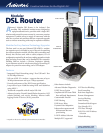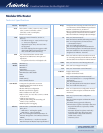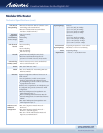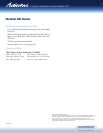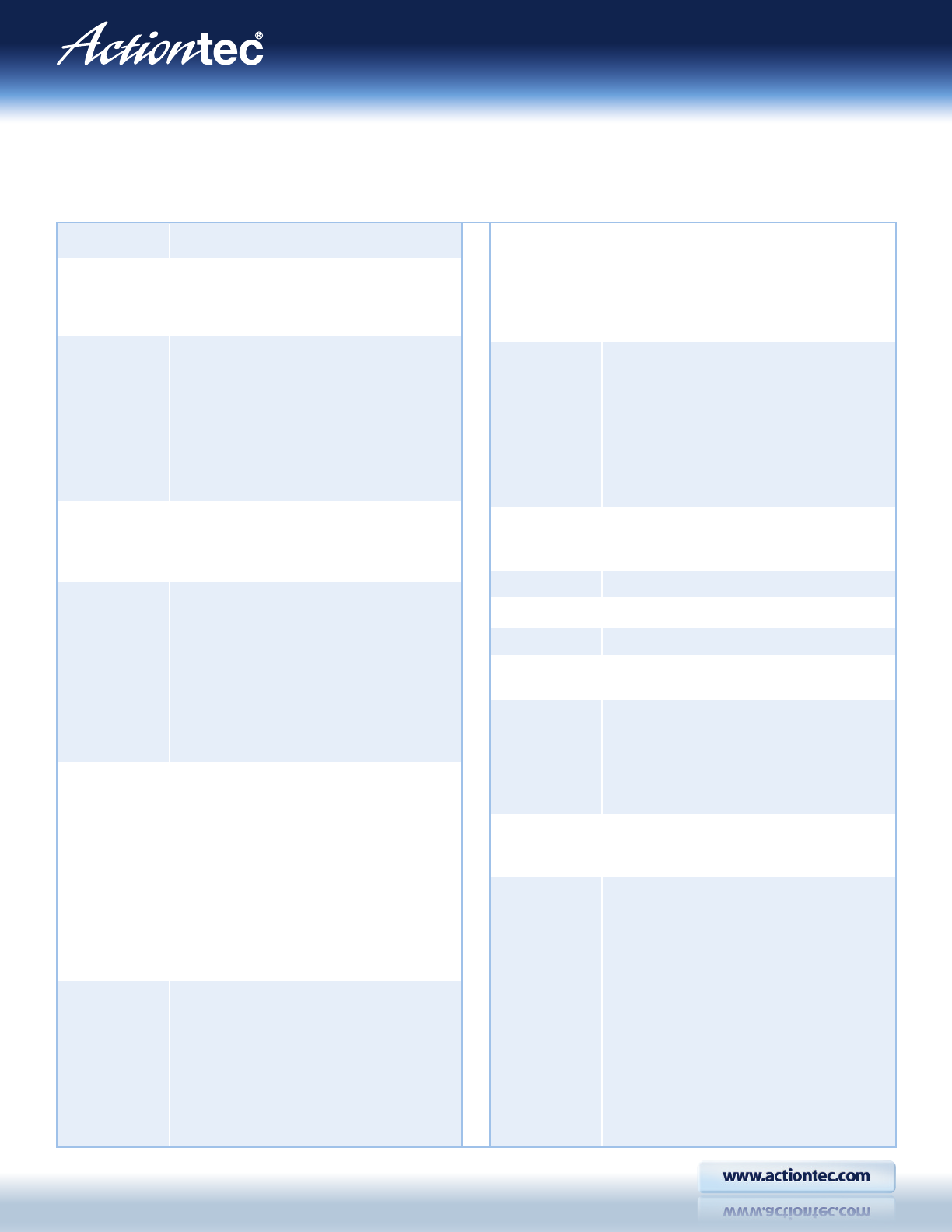
Creative Solutions for the Digital Life
™
Modular DSL Router
Technical Specifications
Descriptions
•
ITU G.992.1 (G.dmt), G.992.2 (G.Lite), G.994.1
(G.hs), G.992.3 (G.dmt.bis), G.992.4
(G.lite.bis), G.992.5 (ADSL2plus)
•
ANSI T1.413 Issue2
•
ATM User-Network Interface, Version 3.1,
Section 3.
- The full VPI range (0 – 4095) and VCI range
(1 – 65535) are supported.
- Adaptation Layers AAL5, AAL2 and AAL0
are supported.
- The traffic shaping function supports traffic
classes CBR, VBR (real time and non-real
time) and UBR (with PCR limiting).
•
ITU-T Recommendation I.610 B-ISDN
Operation and Maintenance Principles and
Operations.
- F5 segment and end-to-end loopback cells
•
IEEE 802.11g
•
IEEE 802.11b
•
IEEE 802.1x
•
WPA/WPA2
•
WEP 64/128 bit encryption
•
SSID Broadcast enable/disable
•
WPS
•
WMM
•
Multi SSID (4)
•
Auto Channel Selection
•
2 FXS ports for phone/fax connection
•
Modular/Stand-alone mode for Home/
On-the-Road use
•
Remote XML auto configuration
•
Remote auto firmware upgrade
•
Echo cancellation for clear calls
•
Major Codecs (G.711a/u-law, G.729A, G.729AB,
G.726, G.723.1)
•
Caller-ID Type I/Type II
•
Call hold, call waiting, call forwarding, call
transfer, 3-way conference
•
SIP/RTP packet TOS tagging
•
ISO/IEC 8802-3; ANSI/IEEE standard
802.3 part 3.
- IEEE 802.3x – Full Duplex capable
- IEEE 802.3u – Auto negotiation
•
RFC 1213 "Management Information Base for
Network management of TCP/IP-based internet:
MIB-II".
•
D-I-X, "The Ethernet - A Local Area Network:
Data Link Layer and Physical Layer Specifications".
•
Transparent MAC level bridge for Ethernet-like devices
in conformance with the IEEE802.1d specification.
•
ISO/IEC 10038:1993 (E), Std 802.1D.
•
RFC1213 "Management Information Base for Network
Management of TCP/IP-based internet: MIB-II".
•
RFC1493“Definitions of Managed Objects for Bridges”.
•
RFC 791 “Internet Protocol”.
•
RFC 950“Internet Standard Subnetting Procedure”.
•
RFC 1122 “Requirements for Internet hosts
– communication layers”.
•
RFC 1191 “Path MTU discovery”.
•
RFC 1213 “Management Information Base for
Network Management of TCP/IP-based Internet”.
•
RFC 894 “Standard for the transmission of IP
datagrams over Ethernet networks”.
•
RFC 826 “Ethernet Address Resolution Protocol:
Or converting network protocol addresses to 48.bit
Ethernet address for transmission on Ethernet hardware”.
•
RFC 792 “Internet Control Message Protocol”.
•
RFC 768 “User Datagram Protocol”.
•
RFC 793 “Transmission Control Protocol”.
•
Support Static Route
•
Support unnumbered mode
•
RFC 1058 “Routing Information Protocol”.
•
RFC 1723 “RIP Version 2 - Carrying Additional
Information”.
•
RFC 2453 “RIP Version 2”.
•
RFC 1812“Requirements for IP Version 4 Routers”.
•
RFC 1191 “Path MTU discovery”.
•
RFC 2131 “Dynamic Host Configuration Protocol”.
•
RFC 2132 “DHCP Options and BOOTP Vendor
Extensions”.
•
RFC 2131 “Dynamic Host Configuration
Protocol”.
•
RFC 2132 “DHCP Options and BOOTP Vendor
Extensions”.
•
The DHCP client supports the following
minimal subset of options described in RFC2132:
- Requested IP Address (requested by default;
is mandatory)
-
Parameter Request list (subnet-mask only)
-
IP Address Lease time (dhcp-lease-time)
-
Client-identifier (dhcp-client-identifier)
-
Default route (routers)
-
DNS Proxy Server
Features
ADSL
ATM
OAM
Wireless
Module
VoIP Module
Ethernet
Bridge
IP
ARP
ICMP
UDP
TCP
IP Router
RIP
DHCP Server
DHCP Client



